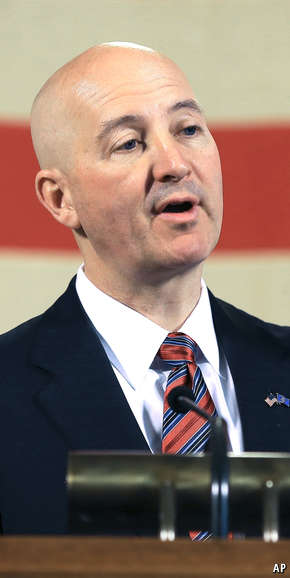by Biodun Iginla, The Economist Intelligence Unit
Killing it
Nebraska’s ban is another sign of the decline in support for the death penalty

Nebraska is about to become the 19th state to ban capital punishment and the first conservative state to do so in more than 40 years. (New Mexico, Connecticut, Illinois and Maryland abolished the death penalty in the past six years, but they were all then led by Democrats.) The state has not executed any prisoner since 1997, when it used an electric chair to do so, a method it subsequently declared illegal. Ten prison inmates are on death row; an 11th died of natural causes on May 24th.
A growing number of Republicans have recently taken up the cause of banning the death penalty in Nebraska and other states. They argue that it is inefficient because it does not deter murderers, more expensive than imprisonment for life thanks to the costly trials and lengthy appeals, and at odds with Christian morality. The evidence seems to back their arguments. The murder rate in New York continued to go down after the state abolished the death penalty; Texas executes more people than any other state, yet does not have a lower murder rate than some states without capital punishment. A report of the California Commission on the Fair Administration of Justice showed that it costs, on average, $90,000 a year more to keep an inmate on death row than to put him into a maximum-security prison to serve a life sentence without parole. And although the Old Testament says “an eye for an eye, a tooth for a tooth”, the New Testament teaches that it is better to show compassion and mercy than to obey the law.
Marc Hyden of Conservatives Concerned about the Death Penalty, a lobby group, views it as “antithetical to conservative principles”. The trend against capital punishment is part of Americans’ increased scepticism about government power, he says, as there is no greater power than the right to kill a citizen. And more Americans worry that innocent people could die because of the death penalty. Since 1973 more than 150 death sentences have been reversed.
Governor Ricketts refutes many of these arguments, which he says are both incorrect and do not apply to Nebraska. He argues that lawmakers are out of touch with Nebraskans, who, he says, overwhelmingly support the death penalty. He considers it an important tool for public safety and the only appropriate punishment for the most heinous crimes. In a statement after his veto, he claimed that a ban would not yield any fiscal savings because the costly trials for horrendous crimes will continue with or without the death penalty; and the bill would be “cruel” to the relatives of victims.
“Nebraska is a microcosm of what is happening in America,” says Robert Dunham, head of the Death Penalty Information Centre. Support for the death penalty is at an all-time low. In 1994, 80% of Americans backed it; only 56% do so today, notes Mr Dunham. Moreover, the Pew Research Centre found that young people are less keen than their elders on capital punishment, and blacks and Hispanics solidly oppose it, so in the near future the abolitionists are likely to be the majority.
Will other conservative states follow Nebraska? Although a divisive topic, it seems to encourage some lawmakers to work together across party lines, as was the case in Nebraska. But it will not be easy. Ernie Chambers, an independent senator who sponsored the bill and who is one of only two African-Americans in the Nebraskan parliament, has introduced bills to ban the death penalty every year since he was first elected in 1970. “The moon was in its seventh house and Jupiter lined up with Mars,” said Mr Chambers after senators overwhelmingly voted for the ban. The age of Aquarius might not dawn quite yet in other conservative states.

No comments:
Post a Comment